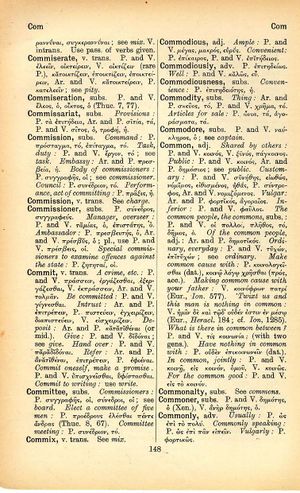common
τί δ' ἢν ῥαφανιδωθῇ πιθόμενός σοι τέφρᾳ τε τιλθῇ, ἕξει τινὰ γνώμην λέγειν τὸ μὴ εὐρύπρωκτος εἶναι; → What if he should have a radish shoved up his ass because he trusted you and then have hot ashes rip off his hair? What argument will he be able to offer to prevent himself from having a gaping-anus | but suppose he trusts in your advice and gets a radish rammed right up his arse, and his pubic hairs are burned with red-hot cinders. Will he have some reasoned argument to demonstrate he's not a loose-arsed bugger
English > Greek (Woodhouse)
adj.
Shared by others: P. and V. κοινός, V. ξυνός, πάγκοινος.
Public: P. and V. κοινός, Ar. and P. δημόσιος; see public.
Customary: P. and V. συνήθης, εἰωθώς, νόμιμος, εἰθισμένος, ἠθάς, P. σύντροφος, Ar. and V. νομιζόμενος.
Vulgar: Ar. and P. φορτικός, ἀγοραῖος.
Inferior: P. and V. φαῦλος.
The common people, the commons, subs.: P. and V. οἱ πολλοί, πλῆθος, τό, δῆμος, ὁ.
Of the common people, adj.: Ar. and P. δημοτικός.
Ordinary, everyday: P. and V. τυχών, ἐπίτυχών; see ordinary.
Make common causewith: P. κοινολογεῖσθαι (dat.), κοινῷ λόγῳ χρῆσθαι (πρός, acc.).
Making common causewith your father: V. κοινόφρων πατρί (Eur., Ion. 577).
'Twixt us and this man is nothing in common: V. ἡμῖν δὲ καὶ τῷδʼ οὐδέν ἐστιν ἐν μέσῳ (Eur., Heracl. 184; cf. Ion, 1285).
What is there in common between? P. and V. τίς κοινωνία; (with two gens.).
Have nothing in common with: P. οὐδὲν ἐπικοινωνεῖν (dat.).
In common, jointly: P. and V. κοινῇ, εἰς κοινόν, ὁμοῦ, V. κοινῶς.
For the common good: P. and V. εἰς τὸ κοινόν.

